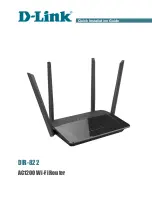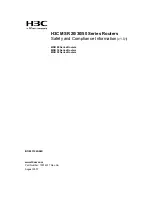
DGS-3700-12/DGS-3700-12G Series Layer 2 Gigabit Ethernet User Manual
241
process between client and host as they “exchange keys” in looking for a match and therefore authentication to
be accepted to negotiate encryptions on the following level.
Encryption:
The second part of the ciphersuite that includes the encryption used for encrypting the messages sent
between client and host. The Switch supports two types of cryptology algorithms:
•
Stream Ciphers – There are two types of stream ciphers on the Switch,
RC4 with 40-bit keys
and
RC4
with 128-bit keys
. These keys are used to encrypt messages and need to be consistent between
client and host for optimal use.
•
CBC Block Ciphers – CBC refers to Cipher Block Chaining, which means that a portion of the
previously encrypted block of encrypted text is used in the encryption of the current block. The Switch
supports the
3DES EDE
encryption code defined by the Data Encryption Standard (DES) to create
the encrypted text.
Hash Algorithm
: This part of the ciphersuite allows the user to choose a message digest function which will
determine a Message Authentication Code. This Message Authentication Code will be encrypted with a sent
message to provide integrity and prevent against replay attacks. The Switch supports two hash algorithms,
MD5
(Message Digest 5) and
SHA
(Secure Hash Algorithm).
These three parameters are uniquely assembled in four choices on the Switch to create a three-layered encryption
code for secure communication between the server and the host. The user may implement any one or combination of
the ciphersuites available, yet different ciphersuites will affect the security level and the performance of the secured
connection. The information included in the ciphersuites is not included with the Switch and requires downloading from
a third source in a file form called a
certificate
. This function of the Switch cannot be executed without the presence
and implementation of the certificate file and can be downloaded to the Switch by utilizing a TFTP server. The Switch
supports SSLv3 and TLSv1. Other versions of SSL may not be compatible with this Switch and may cause problems
upon authentication and transfer of messages from client to host.
Download Certificate
This window is used to download a certificate file for the SSL function on the Switch from a TFTP server. The
certificate file is a data record used for authenticating devices on the network. It contains information on the owner,
keys for authentication and digital signatures. Both the server and the client must have consistent certificate files for
optimal use of the SSL function. The Switch only supports certificate files with .der file extensions. The Switch is
shipped with a certificate pre-loaded though the user may need to download more, depending on user circumstances.
Ciphersuite
This window will allow the user to enable SSL on the Switch and implement any one or combination of listed
ciphersuites on the Switch. A
ciphersuite
is a security string that determines the exact cryptographic parameters,
specific encryption algorithms and key sizes to be used for an authentication session. The Switch possesses four
possible ciphersuites for the SSL function, which are all enabled by default. To utilize a particular ciphersuite, disable
the unwanted ciphersuites, leaving the desired one for authentication.
When the SSL function has been enabled, the web will become disabled. To manage the Switch through the web
based management while utilizing the SSL function, the web browser must support SSL encryption and the header of
the URL must begin with https://. (Ex. https://10.90.90.90) Any other method will result in an error and no access can
be authorized for the web-based management.
To view this window click,
Security
>
SSL Settings
as shown below:
















































